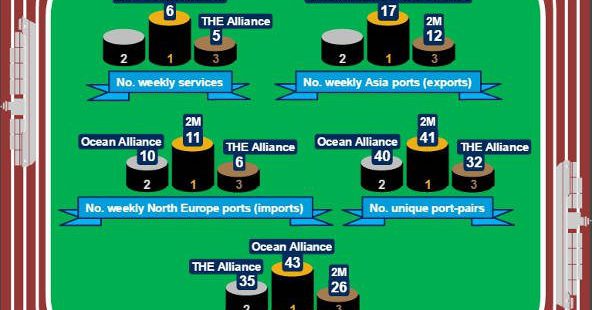
Drewry has reported that new capacity in the key alliance battleground of Asia-North Europe will add downwards pressure to freight rates in its latest Container Insight Weekly, but the consultancy has also suggested that the impact will be lessened as nearly one-third of all direct service port pairs are unique to one alliance.
The 2M carriers have secured the largest number of unique port pairs with 41, ahead of the Ocean Alliance with 40 and THE Alliance with 32, with price reductions in the busiest lanes, such as Shanghai to Rotterdam, reported by Drewry.
However, analysis has revealed that this trend might not be universally followed in every lane the alliances offer as Asia to North Europe has significantly less competition, which will allow the dominant carriers to resist rate downgrades.
Shippers will also have a total of 372 direct port pair options in the westbound Asia to North Europe trade to choose as of April 1.
Infographic: Carrier Alliances Ready For World Trade
But due to the fragmented way in which the alliances have set up their networks to distinguish themselves, Drewry reported that 113 of those port pairs – approximately 30% of the total – will be unique to one alliance.
Therefore, the commercial pricing pressure in nearly one-third of all port pairs will be greatly reduced.
Drewry’s analysis has also shown that while the number of calls from Shanghai to Rotterdam will remain at 12 per week the average transit time will speed up to 31.1 days, from 34.8 days, with five services offering quicker transit times, 25 being the best, than the previous best of 29 days.
History of Asia-North Europe service speeds (knots)

Drewry stated in its report: “It makes commercial sense for carriers to follow the cargo but it does mean other more niche shippers suffer from slower transits and fewer service options.”
“Interestingly, carriers will not have to increase the operating speed of their ships in order to meet these quicker transits. Instead, they will achieve it by giving priority to the major inbound ports such as Rotterdam, Antwerp and Hamburg by making them the first inbound call.
“While the data does show 2M operating the fastest ships this does not automatically mean they offer the quickest transit times. Because 2M tends to cram its services with more port calls, averaging 16 per round voyage in Asia-North Europe – versus 14.3 for Ocean Alliance and 12.4 for THE Alliance, it has to go faster to offer comparable transit times.”
Source: PTI
